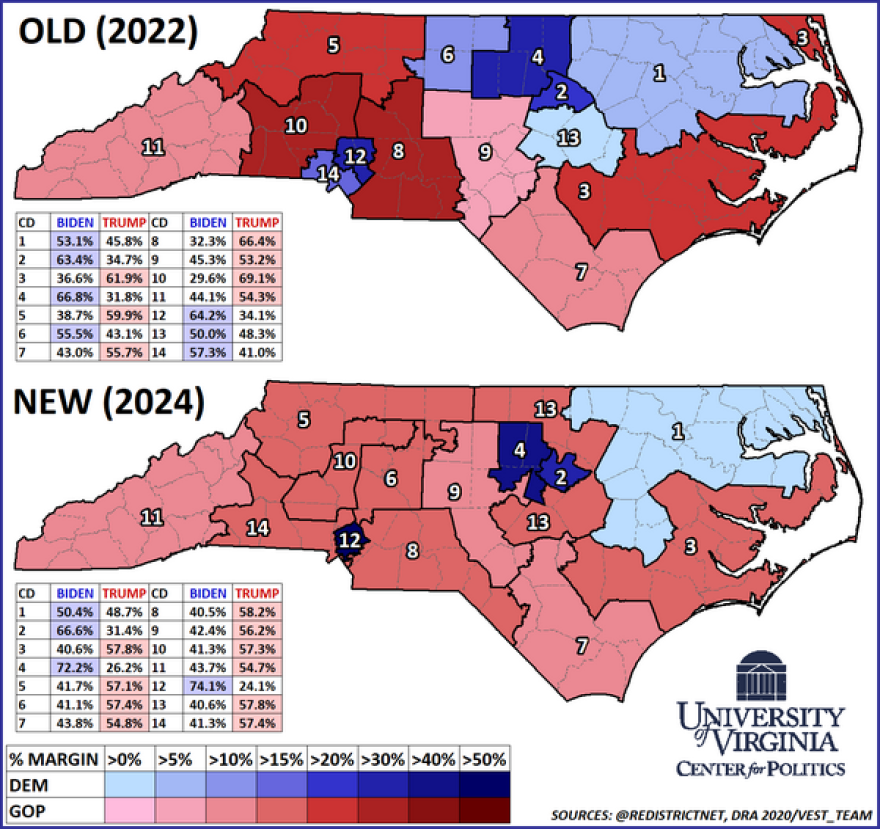Many are currently anticipating the decision of the U.S. District Court for the Middle District of North Carolina’s recent hearing of closing arguments in the state’s controversial redistricting case.
The National Association for the Advancement of Colored People, the oldest and largest civil rights organization in the country, along with other organizations like Common Cause North Carolina, contended in North Carolina NAACP v. Berger that the state’s redistricting plans were unconstitutional because they were designed to give the Republican party partisan advantages and reduce the influence of minority voters.
Typical Cause North Carolina is a pro-democracy, nonpartisan group. Among them is Executive Director Bob Phillips.
He stated, “We’re really hopeful that we’ll get a good decision and the relief we’re looking for.” And it is, of course, to have fresh, equitable maps for the election in 2026.
After the state Supreme Court overturned a prior ruling that determined Republican lawmakers had violated the state Constitution by creating maps in 2022 that were biased by extreme partisanship, GOP state lawmakers redrew the contested lines in 2023.
Republican defendants have insisted that the most recent maps were created using regular redistricting criteria, that they do not amount to racial gerrymandering, and that they remain within the parameters of permissible partisan considerations. Phillips and the lawsuit, however, disagree.
“Unquestionably, African American communities in eastern North Carolina are divided in order to dilute their vote,” Phillips added. As a result, the party creating the map gains more authority.
The Piedmont Triad region and Mecklenburg County were the primary focus of congressional district testimony, however there was also disagreement over portions of northeastern and southeastern North Carolina as well as one district in ENC.
A Common Cause and NC NAACP attorney testified during the trial that Black voters’ capacity to elect candidates of their choosing was disproportionately impacted by the layout of the 1st Congressional District in eastern North Carolina.
The redesigned version is the first to leave out Pitt County since 1992, when the district elected a Black lawmaker. Greenville was taken out of the district, and coastal counties with a majority of white people were added.
In November, Democratic U.S. Representative Don Davis narrowly prevailed in the redrawn district.
Attorneys claimed that Republicans violated the federal Voting Rights Act by dividing the Black Belt counties, and that the area now only has one Black state senator instead of two or three.
According to Phillips, the case focuses on addressing the concerns of the minority population rather than just lines on a map. He clarified that without representation, their voice is not heard when it comes to what they need in terms of schools, the environment, and transportation.
Redistricting in North Carolina takes place every ten years after the U.S. census. According to Phillips, a structural reform is required because it has been characterized by recurrent legal challenges and modifications to the maps used for representative elections.
“If we had a better process, we wouldn’t have to go through this,” he remarked. Naturally, the main issue is that legislators create their own districts in order to consolidate their authority. When Democrats were in power, they definitely did it. Republicans are doing it now, and they can be even more accurate because of advanced technology. However, this issue will persist as long as we permit the legislators to create their own districts.
North Carolina is one of 33 states whose legislators have a major say in congressional redistricting, according to Ballotpedia. Commissions create congressional district lines in nine states, while two states employ a hybrid system where commissions and legislatures share redistricting power. Since each of the other states has a single congressional district, redistricting is not required.
According to Phillips, the midterm elections will be greatly impacted by any decision. The three judges involved have stated that they will reach a ruling prior to the December deadline for candidate filing. Republican presidents appointed all three.






